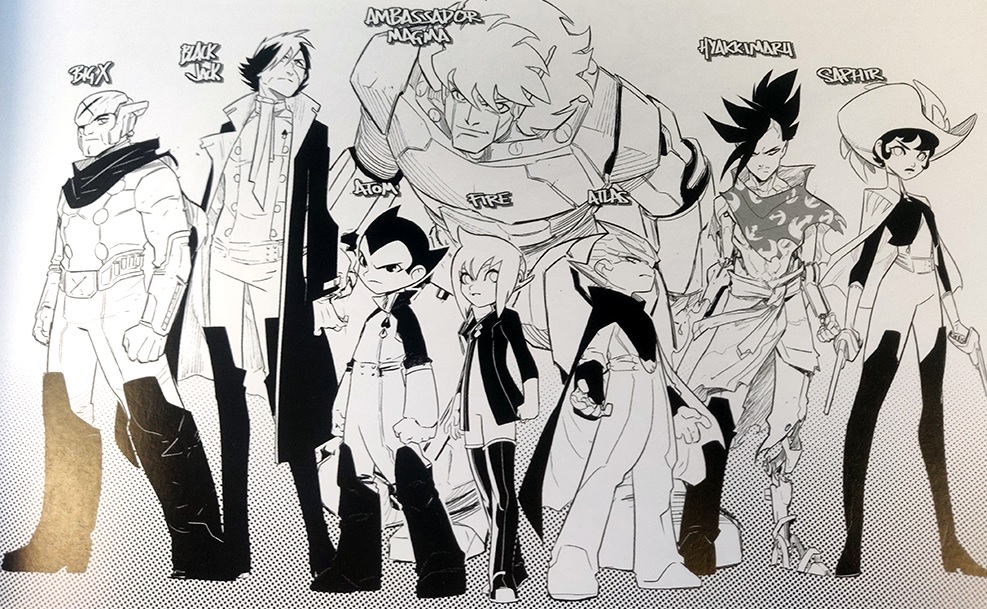By publishing the first Tezucomi collection from January 2021, Delcourt editions have enabled French-speaking readers to discover a formidable Japanese editorial project. It reinvents the notion of tribute by proposing to Japanese and non-Japanese authors to reinterpret cult works of Osamu Tezuka, the father of manga. With total freedom of tone and style, the first two collections (see here the reviews of volumes 1 and 2) delighted our editors. It is with a lot of expectation that we discovered this ultimate opus.
Between regulars and newcomers
This collection brings together again a very nice team of creators. Informed readers will find authors already met in previous volumes. Victor Santos, Ishida Atsuko, Philippe Cardona, Kenny Ruiz and Elsa Brants come to present new visions. For the latter, for example, she goes from Black Jack (Volume 1) to Princess Sapphire. A big gap that demonstrates all the inventiveness of this author. This volume also introduces new authors: Tagame Gengoro, Souya and Takeshi Nogami. Some like Sourya are known to the French public, especially for his work on the series Rouge at Ankama, a spin-off of the Freak's Squeele universe. These authors offer by their diversity reinterpretations again very daring of Tezuka's works. Indeed, you first find manga authors or creators very influenced by Japanese comics. But authors of classical works such as Victor Santos and Keeny Ruiz are also invited, who will cleverly mix multiple influences. Then, the authors invited in this collection illustrate the diversity of the B.D. Next to specialists in fantasy and humor, there is a master of gay art (Gengoro Tagame), a reference of the moe (Takeshi Nogami). The latter will thus offer an iconoclastic vision and always respectful of the material. 
Tezucomi volume 3: between lightness and seriousness
This collection does not fail the rule and allows a diverse readership to find its account. Indeed, the stories first propose eclectic themes. For lovers of light stories, pretty tales, rereadings of Marvelous Melmo or Princess Sapphire are ideal. If you're looking for sci-fi tales of space opera and robotics, Team Phoenix or Astro Boy will delight you. Conversely, devourers of more realistic stories, police investigations will be spoilt for choice between a thriller noir, the hassles of a creator, the journeys of a shadow doctor or the fantasies of a modern couple. These themes once again rich are accompanied by very open graphic universes. This volume leaves in a general way a wider place to the theme of body, sensuality. Whether by diving into the secret world of homosexuals in Japan (Inspector Modoki) or by the relationship of an author and her muse (Doppelgänger). Next to it, you will find works with strongly minimalist features (Heartless, the mouse) that support rather dark stories. Conversely, stories like Astro, Phoenix or The Child with Three Eyes benefit from drawings eyeing the shonen, the seinen. 
A collection in the form of final fireworks
The great success of the Tezucomi project lies in the choice of works. It was indeed a question of achieving three goals. The first was to publicize the richness of Tezuka's work. This is why the collections leave an important place to revivals of lesser-known stories (Neko No Chi, the child with three eyes, Ayako…). The other objective was to attract an audience of neophytes by relying on characters, more famous works: Astro, Metropolis, Black Jack … That's why this volume closes masterfully because fans were waiting for an adventure featuring Astro !!! An elegant ending that responds to the story opening the first volume: Dororo. These two tutelary figures of Tezuka's universe thus frame, like guardians of the temple, the legacy of the father of the manga. Finally, the last objective of the project was to launch series based on these mini-stories. The previous volumes served as a launching pad for the Ayako de Kubu Kirin and Dororo series by Atsushi Kaneko. In this volume, Delcourt editions have given us a big surprise. The inauguration of Team Phoenix, a space opera conceived as a crossover of Tezuka's works. A fan's fantasy carried with talent by Kenny Ruiz as evidenced by the short story presented and the recent release of the first volume of the series. With this latest opus ends a very beautiful editorial adventure. Tezucomi is at once an anthology, a tribute and a relay. It reminds us of Tezuka's immense influence on manga and comics in general. You can find the entire series from Delcourt editions.




























![Sum’One sort la pépite électro Let It Snow et le EP Hello Vera Sum'One - Let It Snow [Official Video]](https://www.justfocus.fr/wp-content/uploads/2024/11/SumOne.jpg)









